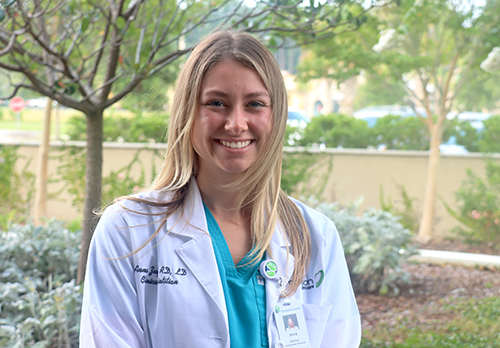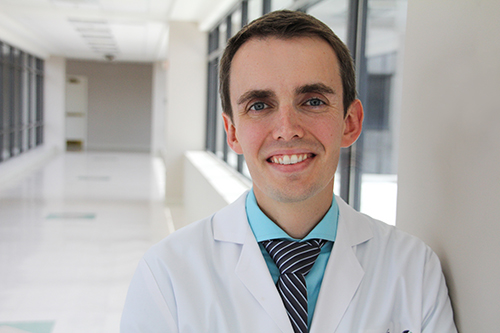Meat as a Side Dish: Is it OK to eat less or no meat during cancer treatment?
Nutrition, Cancer
Our experts weigh in on a plant-forward diet and its impact on your cancer treatment and risks of developing certain cancers
St. Joseph’s/Candler has launched a multi-part series examining the health benefits of reducing the amount of animal food sources you consume in your diet. It’s called, Meat as a Side Dish. While we respect everyone’s health decisions, including diet choices, we hope you find the information in these articles educational and maybe even a little inspiring.
If you are diagnosed with cancer, diet plays a vital role in your treatment plan and recovery. One macronutrient that our Lewis Cancer & Research Pavilion oncology dietitians like to focus on is protein.
But if you are a vegetarian or vegan or try to eat more plant-forward, your cancer diagnosis doesn’t have to change that. There are still many ways you can get protein.
Related Article: Meat as a Side Dish: Plant-based protein substitutes
“Protein really helps maintain their muscle mass and helps their immunity. Protein is really important during treatment,” stresses LCRP outpatient oncology dietitian Anna Zugan, who sees patients in Bluffton and Hilton Head.

It’s also important to get adequate amounts of fruits and vegetables, Zugan adds. She recommends a minimum of five servings of fruits and vegetables per day. She acknowledges that can be hard, especially if your cancer treatment has you feeling nauseated, not hungry and fatigued.
“I know it can be hard, but just try to make sure you are getting those minerals, vitamins, phytonutrients, antioxidants to help fight your cancer alongside treatment,” Zugan says. “A plant-based diet tends to have higher amounts of fiber and antioxidants, more vitamins and minerals, as long as you also make sure you are getting protein too. I am happy to work with patients and offer whatever tips I can.”
One other tip Zugan stresses is getting enough fluids. Hydration is also important to your recovery because it helps keep your cells hydrated and makes sure you don’t get dehydrated, which can speed up side effects, Zugan says. Try to drink plenty of water, and you could also add electrolyte drinks and even things like broths and soups.
Dr. Stephen Ramey is one of our radiation oncologists at the LCRP. He too says he gets a fair number of patients asking about diet during treatment.
“I tell patients the things you’ve heard all your life that are healthy, are good for you to eat during and after treatment for cancer,” says Dr. Ramey, who’s been a vegetarian for about seven years. “Since patients are living much longer after a cancer diagnosis, many may have a higher risk of dying of heart disease than their cancer. I tell them to follow the American Heart Association’s guidelines for a heart-healthy diet.”
What Dr. Ramey advises against is extreme dieting during cancer treatment. Even if you are overweight, radiation treatment is not the time to seek to dramatically lose weight. That’s because your initial treatment plan is based on your weight at that time. Drastic weight loss can cause a delay in your treatment and prolong your recovery.

“I’m not usually concerned about those diets where patients are switching to more plant-based. It’s those extreme diets where they drastically cut calories that concern me. Usually, we don’t want patients to lose a lot of weight during radiation,” Dr. Ramey says. “As long as you are maintaining the caloric intake and protein, I think a vegetarian diet is fine during treatment and may even be helpful.”
Both Dr. Ramey and Zugan emphasize that if you are considering any changes in your diet or adding supplements, you should consult with your healthcare team first.
Can what you eat actually prevent cancer?
That’s impossible to say. So many things contribute to why you may get cancer – smoking, alcohol abuse, lack of exercise, obesity and certainly what we cannot control, our genetics.
But there is published research that shows people who have a plant-based diet tend to have a less risk of chronic conditions, such as diabetes, heart disease, obesity and certain types of cancers too.
“Particularly with colorectal cancers, there’s an association with red meats and processed meats and an increased risk of cancer,” Dr. Ramey said. “A large study looked at associations of diet with different types of cancers, and colorectal cancer particularly seemed to decrease with more of a plant-based diet. There’s some signal that might be the case in breast cancer and prostate cancer as well.”
Both the American Institute for Cancer Research (AICR) and World Cancer Research Fund (WCRF) have done research on diet and cancer risks. According to their findings, individuals who limited alcohol, red meat and processed meat had a decreased risk of developing colorectal cancer. Additionally, individuals who adhered to nutrition related recommendations for cancer prevention had a 51 percent decrease in breast cancer risk compared to individuals who met none or only a few of the recommendations.
Those recommendations are:
- Consuming less than 500 grams of red meat and less than 25 grams of processed meat per week.
- Eating more fruits and vegetables.
- Limiting alcohol use.
Additionally, plant-forward eating tends to lead to a healthier weight which reduces your risk for multiple cancers associated with being overweight or obese, such as multiple myeloma, esophageal, thyroid, gallbladder, stomach, liver, pancreas, kidney, colorectal and certain gynecological cancers.
But Dr. Ramey also cautions that you can eat unhealthy as a plant-based eater. So watch how many sugary desserts and drinks and processed foods you consume, and make sure whatever you choose to eat, you are getting a balanced meal.
Also in this series: